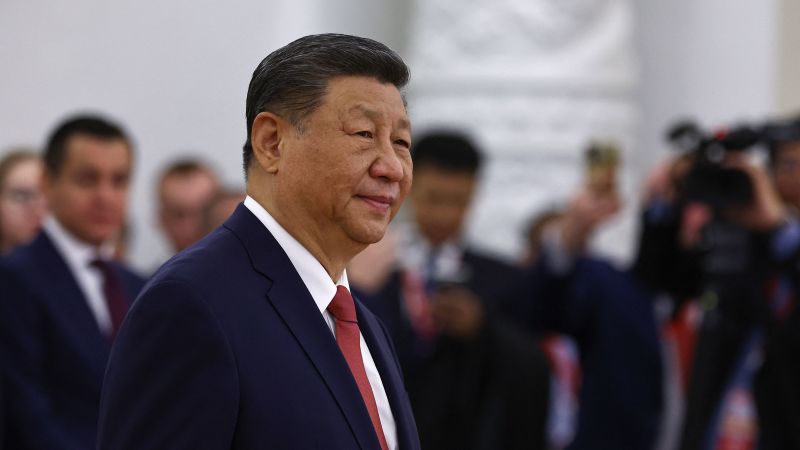
A summit of leaders from the BRICS group of major emerging economies kicks off in Brazil on Sunday, marking a significant absence: Chinese leader Xi Jinping will not attend the annual gathering for the first time in over a decade. This decision comes as BRICS—comprising Brazil, Russia, India, China, and South Africa, and recently expanded to include Egypt, the United Arab Emirates, Ethiopia, Indonesia, and Iran—faces critical geopolitical and economic challenges.
Xi’s absence from the two-day summit in Rio de Janeiro occurs at a pivotal moment for BRICS. Some members are contending with a July 9 deadline to negotiate U.S. tariffs set to be imposed by President Donald Trump. The group is also navigating the global economic uncertainty triggered by Trump’s disruptive trade policies, adding pressure to demonstrate unity. By not attending, Xi misses a key opportunity to position China as a stable alternative leader to the U.S., a role Beijing has sought to project to the Global South amid Trump’s “America First” policy.
Strategic Absence or Reprioritization?
Despite Xi’s absence, Beijing’s commitment to BRICS remains strong, according to observers. Xi’s decision to send his No. 2 official, Li Qiang, instead does not indicate a diminished importance of BRICS to China’s strategy of counterbalancing Western power. Chong Ja Ian, an associate professor at the National University of Singapore, notes,
“BRICS is part and parcel of Beijing’s effort to ensure it isn’t hemmed in by U.S. allies.”
However, with Trump in office, the pressure may have eased, allowing Xi to focus on domestic economic challenges.
China is grappling with significant economic hurdles amid trade tensions with the U.S., and its leaders are preoccupied with planning for the next five years ahead of an important political conclave. This context likely influenced Xi’s decision to prioritize domestic issues over attending the summit. Brian Wong, an assistant professor at the University of Hong Kong, suggests that Li will likely focus on strengthening energy ties and promoting China’s offshore and digital currency for trade within BRICS.
Geopolitical Dynamics and Attendance
Xi is not the only notable absentee from the summit. Russian President Vladimir Putin will participate via video link, avoiding travel due to the risk of arrest under an International Criminal Court warrant related to alleged war crimes in Ukraine. This leaves Indian Prime Minister Narendra Modi and South African President Cyril Ramaphosa as key attendees, with Modi also engaging in a state visit to Brazil.
The absence of Xi and Putin provides a platform for Modi to assert India’s influence within the group. Meanwhile, some new BRICS members have yet to confirm their attendance, though Indonesia’s Prabowo Subianto is expected to join. Uncertainty lingers over Saudi Arabia’s acceptance of a full membership invitation.
Brazilian President Luiz Inácio Lula da Silva might feel the impact of Xi’s absence less acutely, given Xi’s recent visit to Brazil for the G20 summit and a state visit, during which several cooperation agreements were signed. Lula’s own visit to China in May further underscores the ongoing diplomatic engagement between the two nations.
BRICS’ Role in a Multipolar World
Founded in 2009 as an economic coalition, BRICS positions itself as a counterbalance to the Group of Seven (G7) major developed economies. The group has gained prominence as nations push for a “multipolar world” with more distributed power, especially as Beijing and Moscow seek to enhance their global influence amid tensions with the West.
However, BRICS’ diverse composition, encompassing countries with varying political and economic systems, poses challenges. The group’s efforts to present a unified voice often encounter internal disagreements. A recent statement expressing “grave concern” over military strikes against BRICS member Iran exemplifies this, as it refrained from directly naming the U.S. or Israel, the perpetrators of the strikes.
The Push for De-dollarization
One area where BRICS members find common ground is in reducing reliance on the U.S. dollar. This de-dollarization is especially appealing to members like Russia and Iran, which face heavy U.S. sanctions. Brazil’s host term includes goals to increase payment options and reduce vulnerabilities and costs associated with dollar reliance.
Despite discussions, the creation of a “BRICS currency” remains unlikely. The idea, proposed by Lula in 2023, has met resistance from Trump, who threatened severe tariffs on BRICS countries supporting such a currency. As the summit unfolds, observers will closely watch how strongly leaders advocate for national currencies, especially given China’s leadership within the group and the enduring influence of U.S. economic power.
As BRICS leaders convene in Rio, the absence of Xi Jinping underscores the complex interplay of global and domestic priorities facing China and its role within this influential coalition.






